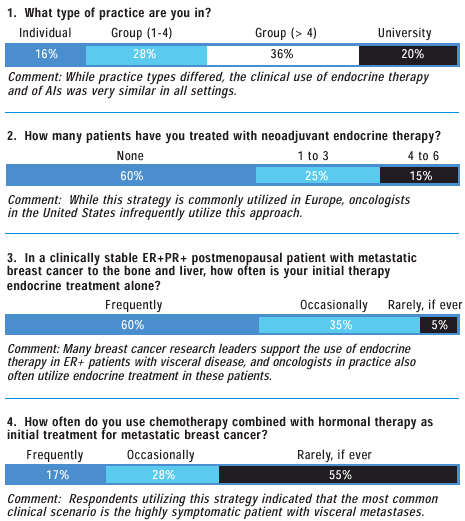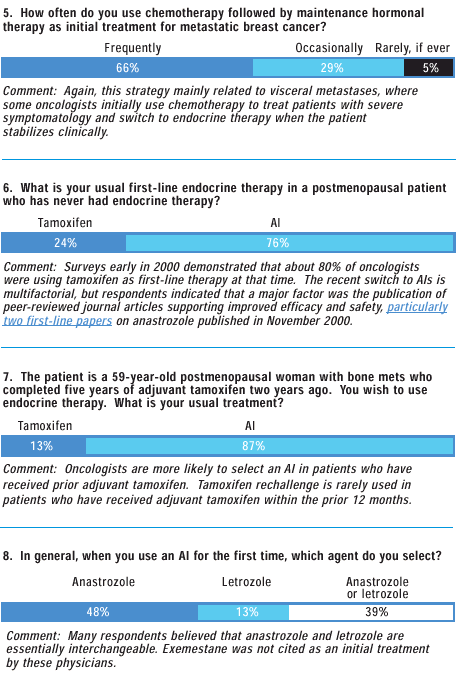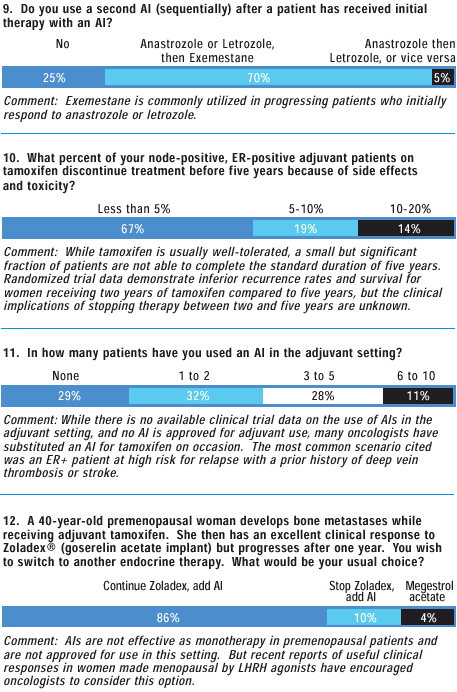|
You are here: Home: BCU 3|2001: Section 4

Section 4
Aromatase Inhibitors in
Clinical Practice
FIRST-LINE
ENDOCRINE THERAPY IN POSTMENOPAUSAL WOMEN
Aromatase inhibitors
are far better than tamoxifen, not only in terms of antitumor activity,
but also the safety profile, because of the risk of thromboembolic
complications with tamoxifen and the agonist effect on the endometrium.
Even though there were few such events in the first-line metastastic
trials, the risk of vaginal bleeding was almost 50 percent lower
with anastrozole compared to tamoxifen. From the individual patient
point of view, postmenopausal bleeding starts a domino effect. An
ultrasound is required, the gynecologist becomes involved, and the
patient may end up having an endometrial biopsy or D&C. And
then you find out that this was the effect of tamoxifen. Whereas,
if that can be avoided with a drug with better antitumor activity
— controlling the disease for a longer period of time —
you have a better overall therapeutic index.
—Aman
Buzdar, MD

METABOLIC
EFFECTS OF ANASTROZOLE VS LETROZOLE
There is published
peer-review data showing that anastrozole — even at five to
10 times the recommended package dose — does not blunt the
response to ACTH stimulation and does not interfere with other P-450
cytochrome enzymes. However, 2.5 milligrams of letrozole blunts
the secretion of aldosterone and cortisone, and this could have
clinical implications.
The question
is whether this is clinically relevant? Overt adrenal insufficiency
has not been reported with letrozole, but it is possible that this
may not become manifest under normal circumstances, but only under
acute stress — for example, with sepsis or a fracture —
where it might play a major role. Many side effects are not reported,
because we don’t look for them.
In terms of
adrenal insufficiency, a patient may have acute stress — for
example sepsis, where you may be pumping antibiotics into the patient,
but what is actually required is a little touch of cortisone. Unless
we look for these things clinically, we will not see them. I think
this may have clinical implications, particularly in the future,
if we are treating patients in the adjuvant setting for an extended
time period. We don’t have any data on the clinical implications
of keeping patients subclinically adrenally suppressed for, say,
five years.
—Aman
Buzdar, MD
STEROIDAL EFFECTS OF EXEMESTANE
Exemestane is
a very active and impressive compound, but I have concerns because
it is a steroidal substance with steroidal side effects. In some
patients, this agent causes viralization, which may be very subtle.
I use exemestane quite frequently as a second- or third-line therapy,
and I have seen subtle changes such as deepening of the voice and
acne.
Another androgen-related
side effect reported with exemestane in the second-line setting
is that it causes somewhat more weight gain compared to anastrozole
or letrozole. Also, if you look at the risk of thromboembolic complications,
both anastrozole and letrozole are inert compounds and do not interfere
with coagulation pathways. We don ’t have data on exemestane,
and because of its weak androgenic structure, this will need to
be evaluated.
—Aman
Buzdar, MD
CHOICE
OF AROMATASE INHIBITOR
If we did not
have the concern about letrozole causing adrenal problems, letrozole
and anastrozole would — in my mind — be essentially equivalent.
However, anastrozole has an advantage in metabolic selectivity because
— even at substantially higher doses than we use clinically
— there is no interference with other P-450 cytochrome enzymes.
Also, if you look at antitumor activity — and these are indirect
comparisons — both in second-line and in first-line settings,
the total clinical benefit is slightly in favor of anastrozole compared
to letrozole. With exemestane, there is the issue of weak androgenic
activity. If you look at it from the selectivity point of view,
I think out of the three agents that we now have, anastrozole is
the most selective agent.
—Aman
Buzdar, MD
Outside of a
clinical trial setting,we use either anastrozole or letrozole as
our first choice of endocrine therapy for postmenopausal patients
with metastatic breast cancer. Both agents are extremely well-tolerated
and effective, and I currently consider the two interchangeable
for metastatic breast cancer. I will reserve judgment as to whether
there is a true clinically relevant difference until direct randomized
trial data become available. If you just watch me practice, I usually
choose anastrozole — my automatic pilot will write anastrozole
— because I have much more experience with it. There is a rationale
to currently choose either anastrozole or letrozole as opposed to
exemestane, simply because of the magnitude of the available database
and clinical experience.
—Gabriel
Hortobagyi, MD
|
PATTERNS
OF CARE: ENDOCRINE THERAPY AND THE ROLE OF AROMATASE INHIBITOR
IN CURRENT ONCOLOGY PRATICE
Editor’s
Note: In a series of recent educational symposia, about 200
medical oncologists were queried via electronic polling about
their
current use of endocrine therapy and specifically the use
of AIs in breast
cancer management. Compared to similar electronic polling
conducted
last year, the data demonstrate the rapid incorporation of
AIs into
patient care.
|



SELECT
PUBLICATIONS
|
Brodie
AM, Njar VC. Aromatase inhibitors and their application
in breast cancer treatment. Steroids 2000;65:171-9.
Abstract
Buzdar
A. Exemestane in advanced breast cancer. Anticancer
Drugs 2000;11:609- 16. Abstract
Buzdar
A et al. Anastrozole (Arimidex) versus tamoxifen as first-line
therapy for advanced breast cancer (ABC) in postmenopausal
(PM) women? Combined analysis from two identically designed
multicenter trials. Proc ASCO 2000; Abstract
609D.
Crucitta
E et al. New aromatase inhibitors in the treatment of advanced
breast cancer. Int J Oncol 2000;17:1037-41. Abstract
Dowsett M et al. Effects of the aromatase inhibitor anastrozole
on serum oestrogens in Japanese and Caucasian women. Cancer
Chemother Pharmacol 2000;46:35-9. Abstract
Goss PE.
Risks versus benefits in the clinical application of aromatase
inhibitors. Endocr Relat Cancer 1999;6:325-32.
Full
Text
Higa GM.
Altering the estrogenic milieu of breast cancer with a
focus on the new aromatase inhibitors. Pharmacotherapy
2000;20:280-91. Abstract
Kaufmann
M et al. Exemestane improves survival compared with megoestrol
acetate in postmenopausal patients with advanced breast cancer
who have failed on tamoxifen. Results of a double-blind
randomised phase III trial. Eur J Cancer 2000;36
Suppl 4:S86-7. Abstract
Knoche
AJ et al. Efficacy of anastrozole in a consecutive series
of advanced breast cancer patients treated with multiple prior
chemotherapies and endocrine agents: MD Anderson Cancer Center
experience. Breast J 1999;5(3):176-181. Abstract
Lonning
PE. Is there a growing role for endocrine therapy in the
treatment of breast cancer? Drugs 2000;60:11-21.
Abstract
Michaud
LB, Buzdar AU. Complete estrogen blockade for the treatment
of metastatic and early stage breast cancer. Drugs
Aging 2000;16:261-71. Abstract
Muss HB.
New hormonal therapies for breast cancer. Cancer
Control 1999;6:247-255. Full
Text
Mouridsen
H et al. Superior efficacy of letrozole versus tamoxifen
as first-line therapy for postmenopausal women with advanced
breast cancer: Results of a phase III study of the International
Letrozole Breast Cancer Group. J Clin Oncol 2001:2596-2606.
Abstract
|
|
|
